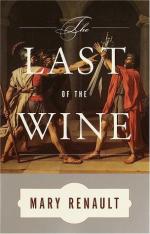|
This section contains 177 words (approx. 1 page at 300 words per page) |

|
Renault explained her refusal to use the past as a metaphor for the present in a 1973 essay, "History in Fiction": ". . . if what you are really talking about is Nazi Germany or Vietnam or Texas, why not say so instead of misleading your readers about Nero or Caesar or Troy?" Beginning with The Last of the Wine, considered her masterpiece, Renault scrupulously followed Herakleitos' maxim "You could step twice into the same river," recreating ancient Greece and bringing her readers to it, not it to them, as Bernard Dick has noted.
In Athens' fall to Sparta in the Peloponnesian Wars, the setting of The Last of the Wine, Renault offers historical perspectives on problems still bedeviling Western society: the seemingly inevitable linkage of corruption with power in charismatic political leaders like Alkibiades; the nature of democracy and the responsibility of the gifted individual to it; the ambivalent...
|
This section contains 177 words (approx. 1 page at 300 words per page) |

|




